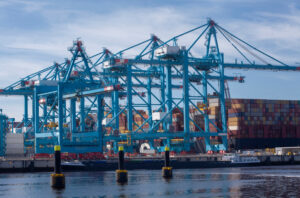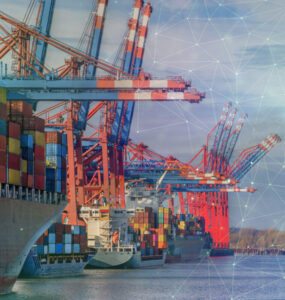The implementation of many technologies that could be used by ports to improve operational efficiency does not happen overnight.
A rigorous process of development and testing takes place before anything can be implemented – and everything from 5G to port call optimisation to artificial intelligence (AI) is being developed across the industry.
Here we highlight just some of the technology developments that have hit the PTI news desk in March 2021.
There are many more to speak of, which will of course be covered in the upcoming Smart Digital Ports of the Future event to be held on 29 March to 1 April 2021.
5G
At the end of 2020, PTI determined that 5G would be one of the top technology trends to watch out for and so far, this has rung true.
Just one of many of the industry’s 5G projects is underway at APM Terminals Barcelona (APMT).
The terminal operator at the Port of Barcelona is working with Telefonica and Mobile World Capital Barcelona to ready the container terminal for the 5G revolution.
The pilot project is seeking to minimise the potential risks of collisions between mobile machinery and fixed elements, vehicles, and people in the terminal.
Sergi Dominguez Tomas, Head of IT, APMT Barcelona told PTI in a recent interview that that project will cover just 25% of the APMT Barcelona terminal operations as part of the proof of concept.
But there is potential for growth and Tomas said, “That’s the reason why we are starting to test this technology here in at APMT Barcelona – to find solutions just to take advantage and be ready for this revolution”.
Artificial Intelligence
AI has been hailed as a solution to terminal inefficiency for a number of years and since 2017 Avlino and IGO Solutions have been working with the Manila International Container Terminal (MICT) to introduce an AI-powered operational optimisation tool.
The terminal operator has successfully implemented YardSight, which is part of a larger AI solution suite called AiCON, developed by US-based AI specialists Avlino, in partnership with IGO Solutions.
Anders Dommestrup, MICT CEO and Executive Director, said in a recent statement that, “We are already seeing very encouraging signs that this new approach can deliver significant efficiencies to equipment utilisation and truck turnaround time, which will be passed on to our customers to further support ICTSI’s conscious effort to reduce its greenhouse gas emission.”
YardSight manages the entire yard operation by optimising the TOS and enhancing resources through advanced Machine Learning (ML)/AI technologies delivered through smart solution engineering, developed in partnership with IGO’s automation expertise.
It is expected that this development will continue beyond yard operations at the terminal to incorporate berthing and warehousing in the future.
Port call optimisation
PortXchange recently spoke with PTI about the future of its port call optimisation solution and how it is looking for more interested parties to join its efforts.
The platform has been built and tested in Rotterdam and then trialled in other ports by different parties including at the Port of Algeciras and Port of Houston.
“Next for PortXchange is a more global deployment of the platform based on the good results and learnings from these different trials. In 2021 we will move from doing trials, to doing regular onboardings of ports and parties to increase the impact,” Dita Bruijn, Director of Operations and PortXchange, told PTI.
PortXchange is also seeking to integrate with the bulk and liquid bulk markets as it looks at the port industry as an entire ecosystem where specific trades cannot be siloed.
“A container vessel may very well depend on a bulk vessel for its departure from the port. The majority of the experience of PortXchange has been on the container side of the industry, which makes the platform very fit for container carriers, terminals, and so on,” Bruijn explained.
“In bulk we have less experience but the same ambition. We are learning – together with the industry – how to optimise bulk port calls and achieve JIT arrival which operationally, commercially and contractually works very differently in the bulk trade.”









